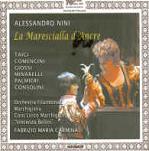Born in 1808, Alessandro Nini worked and studied in provincial Italian cities before being invited to St. Petersburg in 1831 to teach singing and polish his craft, mostly as a composer of church music. He returned to Italy in 1837 and turned out seven operas in a decade (six more were never staged or remained unfinished). Premiered in Padua in 1839, La Marescialla d’Ancre had been heard in more than 20 theatres in Italy by 1844, and later it traveled to Spain, Portugal, and South America. After 1857, however, there is no record of any performances, and that’s a pity. This is an energetic, well-orchestrated work, albeit stupidly and confusedly plotted (I won’t even bother–it has something to do with early-17th-century France and a power-wielding couple who get theirs: she’s tried as a witch), with excellent vocal writing in the true bel canto tradition, fine duets and ensembles, a closing scene for soprano worthy of Donizetti, and gracious, graceful melodies throughout. And the cabalettas are blood-boiling. You won’t be dazzled by any strokes of genius here, but you get the feeling that if Verdi had never been born, we’d have heard more of Nini’s operas by now.
And this is a very good performance. Not one of the singers is familiar to me–nor are the conductor or orchestra. Bongiovanni often releases recordings of rare operas taped live in out-of-the-way places in Italy (this is from the G.B. Pergolesi Opera House in Jesi), and many of them are either truly provincial performances or feature singers who are mediocre. This is not one of them.
In the title role (she’s known as “Galigai”) is a dramatic coloratura named Chiara Taigi (quite stunning too, judging by the production photos), one of those singers who seems to be courting trouble by pushing extra drama into their work by leaning on the notes, and the result is very exciting. The voice is only in trouble on sustained high notes, when a beat enters treacherously; elsewhere her fiorature is fluent and her tone is as lovely or grand as needed. As her husband, Concini, tenor Maurizio Comenici is a biggish-voiced lyric who handles music at all dynamic ranges well, despite too open a throat; and he has no fear of heights. He may not be the next “fourth tenor”, but you won’t complain.
Marzio Giossi sings the role of Michel Borgia, a Corsican who was Galigai’s first love, and although his light baritone gets to the role’s high notes, he doesn’t always sound comfortable. As his wife, Isabella, who falls in love with Concini (I warned you there were compications), Monica Minarelli (in an undercomposed role) is headstrong and well-tuned. The rest of the cast is good, the orchestra is far better than you might guess, and the chorus, which is present in half of the opera’s numbers, is also fine, if occasionally a bit sparse. Conductor Fabrizio Maria Carminati treats the score like middle-Verdi, paying particular attention to the stirring rhythms without ignoring the purely lyrical moments. The recorded sound is aggressive but good, the audience applauds a lot when pleased, and the stage noise is not a bother. The booklet contains good if disorganized notes, along with libretto and English translations–but not a word about singers or conductor. This is as good as Pacini, I’d say, if you’re looking for a guidepost.
































